In this guide I walk you through how I built an AI powered Gmail agent that triages quote requests for an auto repair shop. The system reads every incoming email, decides whether the message contains enough vehicle details to produce a quote, and then either replies instantly asking for missing information or notifies the mechanic by SMS when a quote can be prepared. This single automation recovered thousands in lost sales for one shop. If you want to replicate this for your clients or your own shop you can follow the steps below.
Join our free AI Automation Community to download the n8n template and get support building this agent.
Why this automation matters
Most small auto shops do not run 24 hour customer support. Owners check messages after hours. When quote requests arrive missing key details the owner must ask for more information and then wait until the next workday. That delay costs customers and revenue. A simple AI triage agent removes that delay and keeps leads engaged.
Key benefits include faster response to customers, more leads converted into quotes, fewer missed sales, and clean audit trails that show what the agent did for each incoming message. For a local mechanic this translated into recovered revenue worth over ten thousand dollars per year.
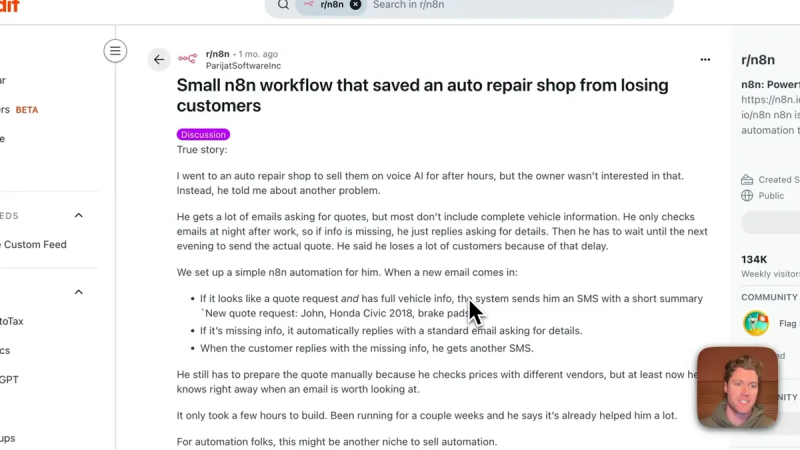
1. System overview
At a high level the automation has three components:
- Incoming email trigger. A shared inbox receives customer messages.
- LLM based decision engine inside n8n that inspects the email and chooses an action.
- Two outbound channels plus logging. The agent either sends a follow up email to the customer asking for missing details or sends an SMS notification to the shop owner. Every event is logged to Google Sheets.
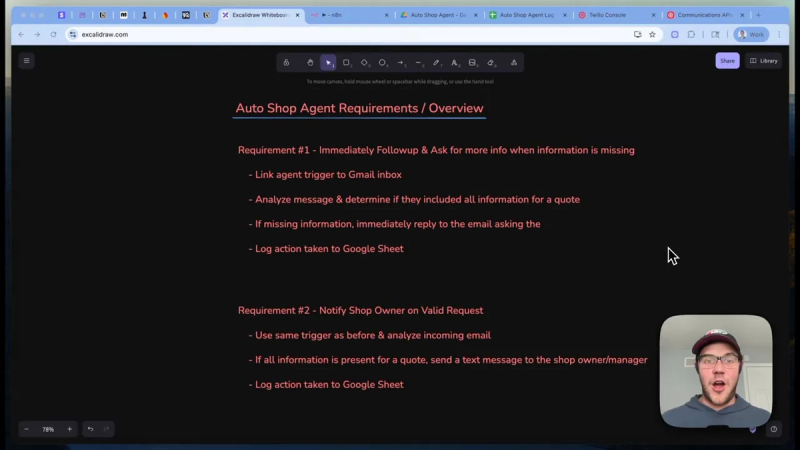
Requirements
To build this agent for a client you need:
- A shared inbox accessible via Gmail or a webhook endpoint.
- An n8n instance to run the automation.
- A large language model API key accessible from n8n.
- A Twilio account to send SMS messages or an alternate notification channel the client uses.
- A Google Sheets document for audit logs.
Define the minimal required fields for a quote in discovery. For most shops these are make, model, year, and a clear description of the issue or part that needs service. You can change these fields later to match a specific client.
2. How the agent decides what to do
The decision logic is implemented in the system prompt and controlled by the LLM inside n8n. The prompt is written to do three main things:
- Confirm the incoming message is an auto repair inquiry and not spam or sales pitch.
- Check whether required fields are present in the message text.
- Choose the correct tool to run next either follow up to customer or notify shop owner, then log the result.
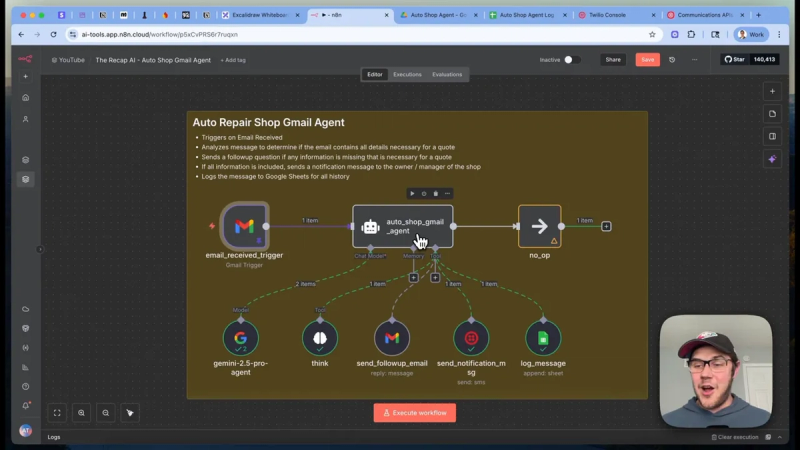
2 The user message format
Supply the LLM with structured metadata for reliability. Pass the following fields into the user message block:
- message ID and thread ID so replies target the correct conversation
- sender address
- subject and timestamp
- full email body text
Providing full content prevents the model from guessing or hallucinating values such as message IDs. During setup make sure you disable message preview truncation so the entire email body is available to the agent.
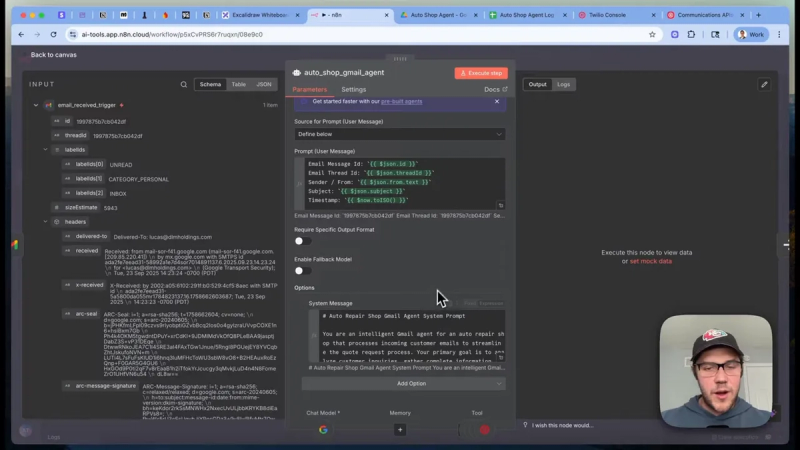
2 Built in think tool
Include an explicit thinking step inside the prompt. Use the built in think tool as a scratchpad so the agent can break down the email and reason about the next action. Ask the agent to:
- Plan an analysis
- Break down email content
- Decide whether the message is a genuine repair inquiry
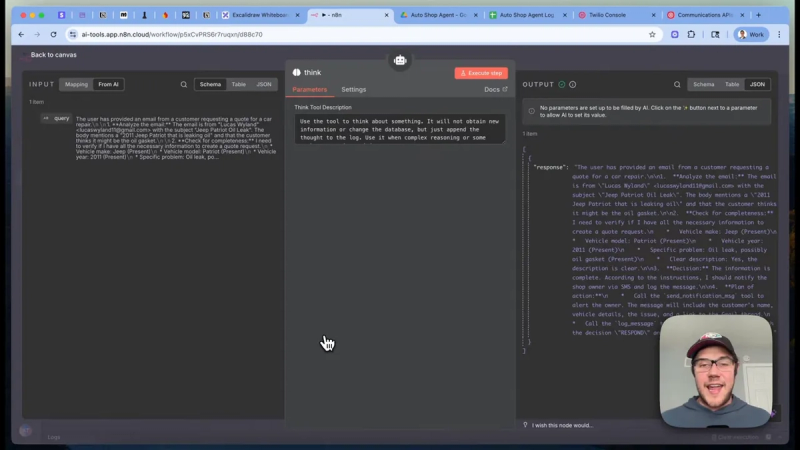
3. Tools setup
This section explains how to configure the three tools the agent uses inside n8n: Gmail reply, Twilio SMS, and Google Sheets logging. I describe the choices I made and provide practical tips you can reuse.
3 Gmail trigger and reply
Connect Gmail as the trigger node. Use a pull interval set to one minute to ensure near real time responses. Turn off the simplify toggle so the node exposes full message content and metadata.
For follow up emails use the Gmail tool with the message resource and reply operation. Let the agent populate the message ID automatically from the metadata you passed earlier. Keep the email as plain text. Provide a template inside the system prompt and let the model craft the actual message content using that template.
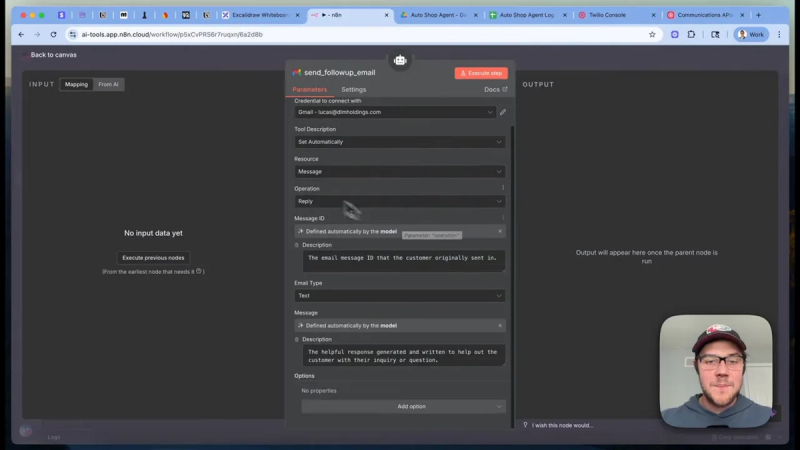
3 Twilio SMS notification
When the incoming email includes all required details the agent sends an SMS to notify the mechanic. Use Twilio or any messaging platform the client prefers. For Twilio you need the account SID and API secret key stored as credentials in n8n. Buy or provision a sending number from Twilio and optionally set up a virtual receiving phone while testing.
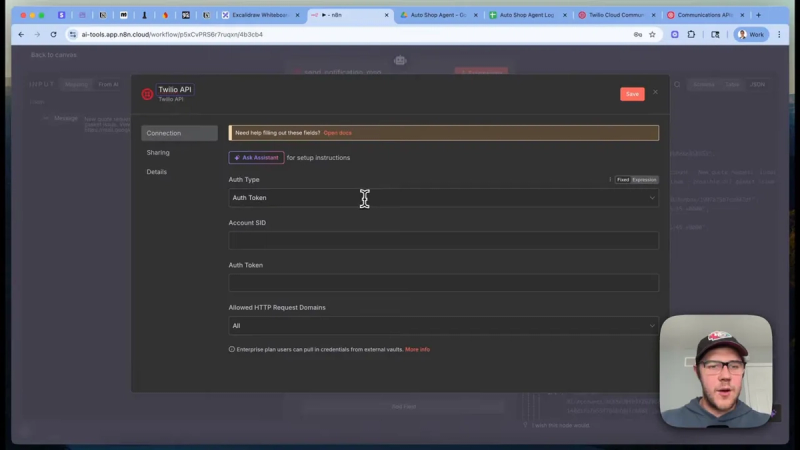
In the Twilio tool choose the SMS resource and set operation to send. Configure the from number and the to number while testing with a virtual phone. For production set the to field to the shop owner phone and complete Twilio verification steps if required. Ask the agent to format the SMS as a colon separated list of key details plus a link to the email thread for quick context.
3 Google Sheets logging
Append a row to a Google Sheets log after every execution. Include columns for timestamp, sender, subject, preview of message, and the action taken. Map each column manually to maintain control of data and to make debugging easier when a client reports a mismatch.
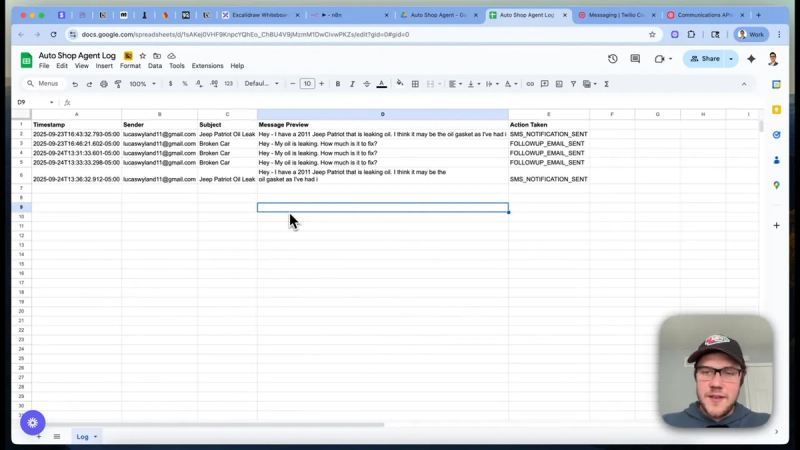
4. Testing and rollout
Follow a three stage process for testing and deployment.
- Unit test the trigger and metadata flow. Send sample emails that are vague and detailed to confirm the agent correctly chooses follow up or notify path.
- Run end to end tests with Twilio virtual phone to confirm SMS content and link behavior. Verify that replies go into the same thread in Gmail.
- Deploy to production with approvals and monitoring. Enable a logging sheet and review logs after the first 24 hours to ensure the agent acted as expected.
Keep a fallback procedure so the owner can opt out of SMS notifications or disable automatic replies while you tune the system. Maintaining a short feedback loop with the client will speed up acceptance and reduce false positives.
5. Business case and pricing
A local shop owner told me he lost many leads because he replied to incomplete quote requests only after work. After we installed the agent the shop received immediate follow ups and notifications. The owner estimated recovered revenue over ten thousand dollars a year from leads that used to drop off.
When you package this automation for clients consider a pricing model that includes setup and a monthly maintenance fee. Typical components to price are:
- Discovery and rule tuning
- n8n workflow setup and LLM cost
- Twilio provisioning and monthly SMS usage
- Support and updates
For many small shops a modest monthly fee will be a strong ROI compared with lost leads.
6. Practical tips and troubleshooting
- Always pass the real message ID and thread ID into the agent to avoid reply failures.
- Keep templates simple. Plain text replies are easier for customers to read and for the agent to generate.
- Use explicit instructions in the prompt to filter out non repair related messages such as vendor pitches.
- Log everything to Google Sheets to build a searchable audit trail for debugging and client trust.
- If SMS delivery requires business verification on Twilio plan for a rollout delay and explain that to clients.
Conclusion
Building an AI Gmail agent with n8n and Twilio is practical and profitable. The agent removes response lag, keeps leads engaged, and returns measurable revenue to small auto shops. The same architecture applies to many local services that rely on quote requests.
Join AI Automation Mastery to get the n8n template for this agent and community support for your builds.





